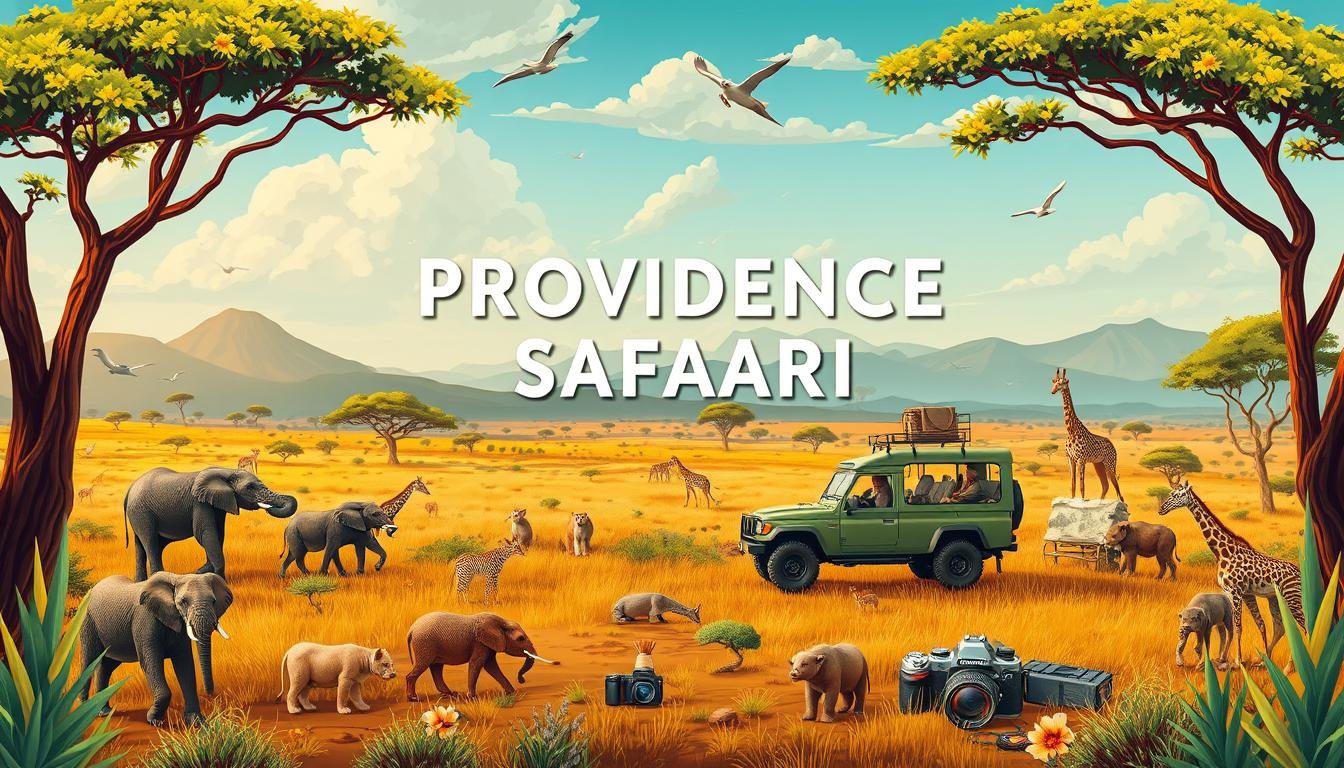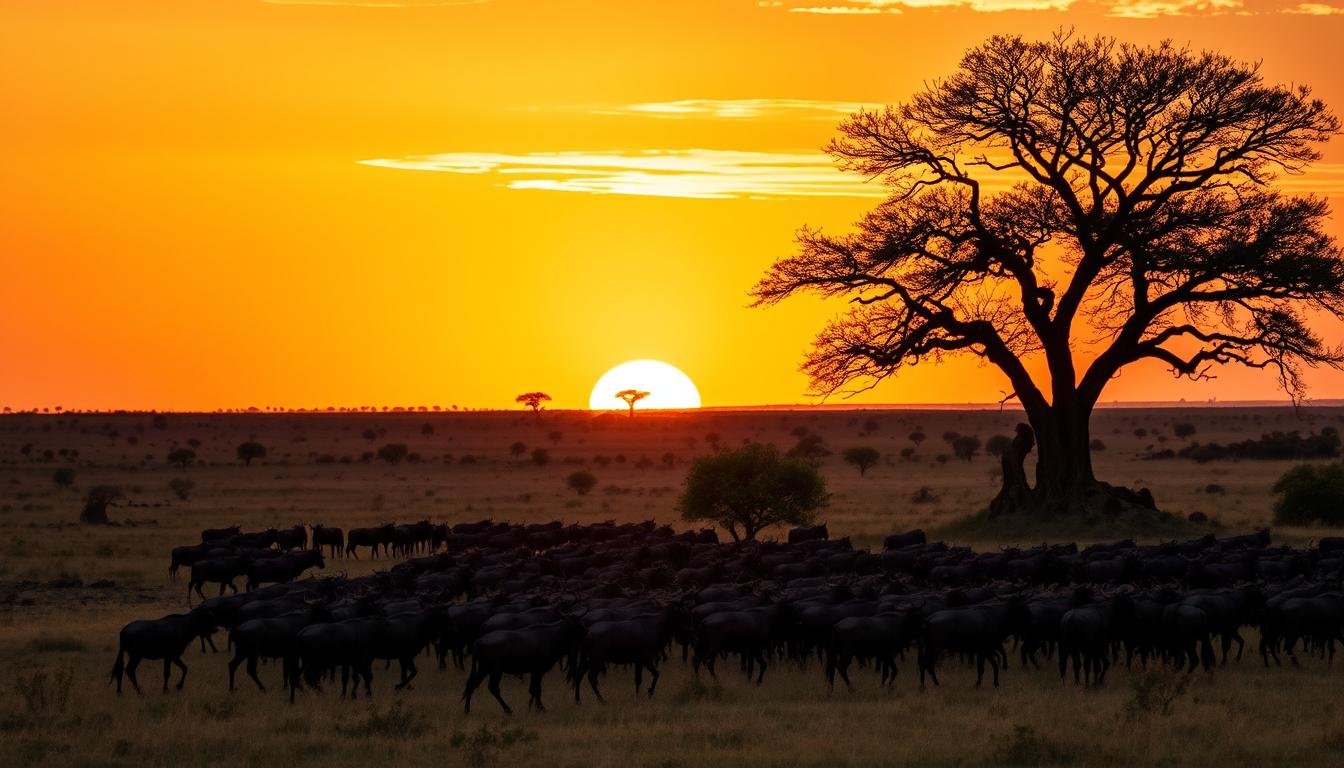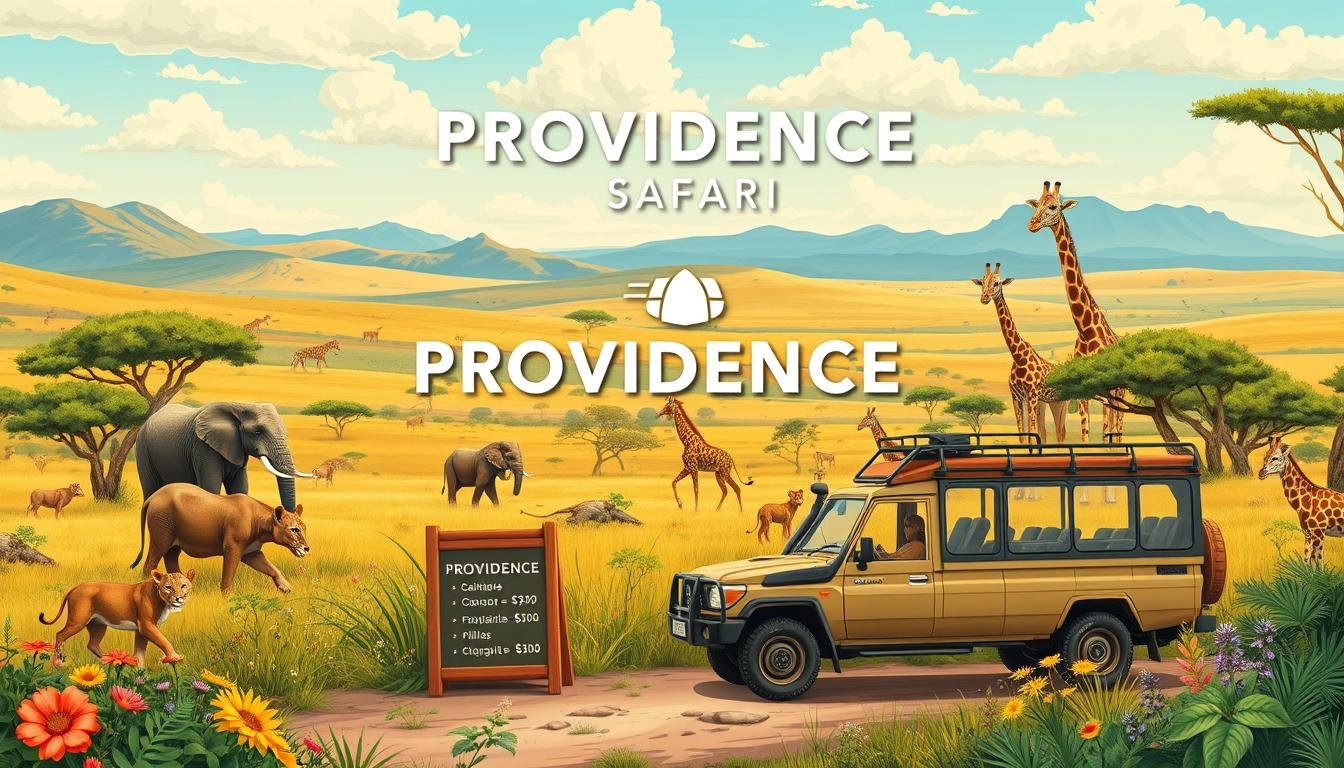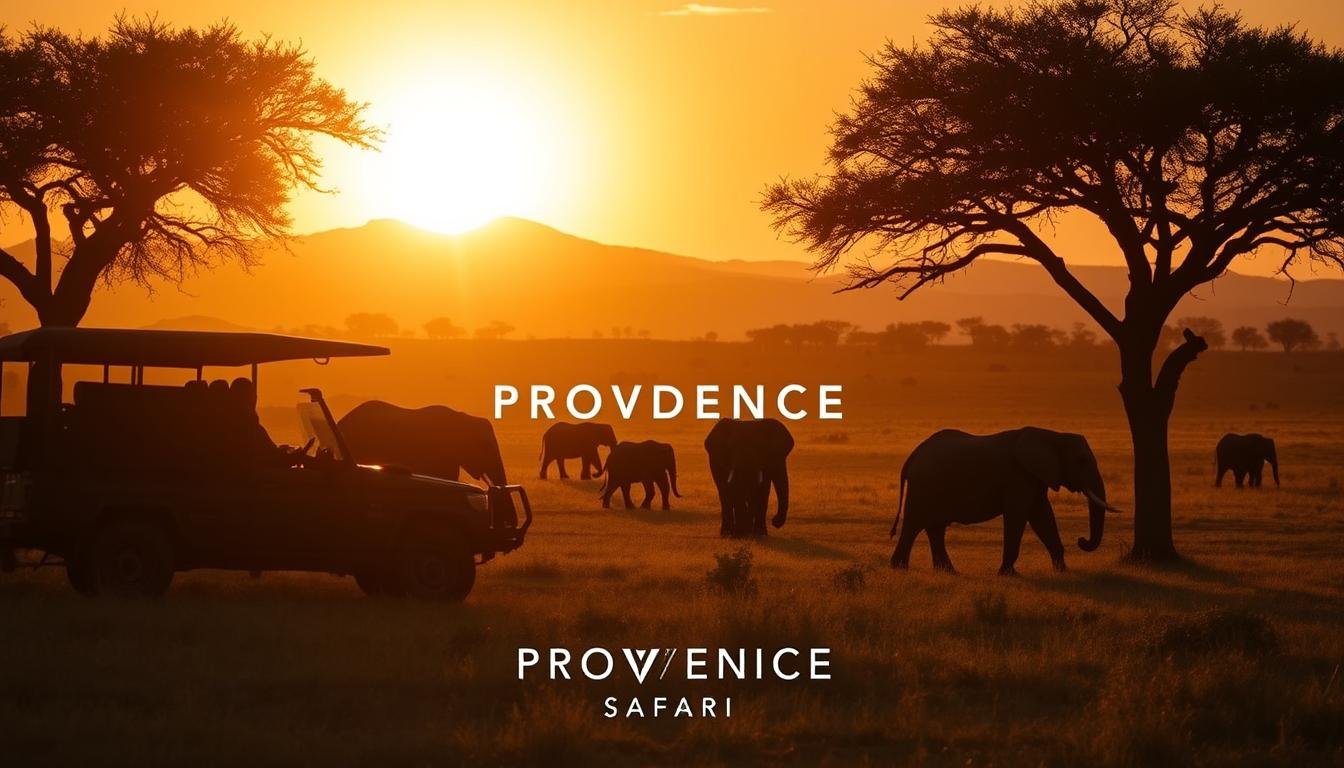Safaris can vary widely in cost, with factors like location, accommodation, and activities affecting the overall price. This guide will help you understand these costs for a great and affordable wildlife trip.
Planning an African safari opens up many options. You can pick from budget-friendly trips to luxurious escapes. Each type suits different tastes and budgets.
Knowing these main costs helps you plan and budget for your safari. From the Serengeti in Tanzania to Kruger National Park in South Africa, we’ll look at options for every budget and preference.
When planning a safari, it’s important to understand the peak and off-peak seasons. The peak seasons for safaris usually happen during the drier months. The off- peak seasons are the wetter months, like November to May in Africa.
Planning a safari in Africa means thinking about more than just the base cost. You’ll need to budget for gear, travel insurance, and tips. These extras can add up fast if you don’t plan ahead.
Planning a safari is exciting but can be tough. To make sure we have a great time, we need a solid budget. Knowing what affects safari costs helps us get ready for our wildlife trip.
When choosing a safari provider, it’s important to work with reputable and approved travel agencies and tour operators. Look for operators that are licensed, insured, and follow industry best practices. With the right payment plans and financing, these amazing wildlife trips can be more affordable.
“With the right financial tools, a breathtaking safari adventure can be within reach for more travelers’”“Safari companies offer flexible payment plans to fit different budgets and tastes.”
Safari operators might offer lower prices for unsold spots close to the trip date. Being flexible with your travel plans can lead to amazing last-minute deals. We need to think about travel documents and health and safety to have a great trip.
Learn about wildlife etiquette and photography tips to make your trip special. Don’t feed the animals and leave no trace. Don't disturb the wildlife.
There are three main types of safaris: budget, mid-range and luxury. Luxury safaris are the most expensive, with high-end lodges and exclusive experiences. Budget safaris cost 0-0 per person per day, while luxury safaris can cost over 0 per person.
Prices are higher during peak seasons, like the dry seasons, when wildlife is easier to see. Off-peak seasons, such as the wet seasons, are cheaper but offer unique experiences.

13 Nov
Many of us dream of going on a safari, seeing Africa’s stunning landscapes and wildlife. But, we must think about the cost of this adventure. Prices vary from Kenya’s savannas to Rwanda’s rainforests. It’s key to understand these costs for a great and affordable wildlife trip.
This guide will help you understand safari prices. We’ll look at what affects costs, the different safari experiences, and how to budget. Whether you’re new to travel or experienced, this article will help you plan a great and affordable safari.
Key Takeaways
- Safaris can vary widely in cost, with factors like location, accommodation, and activities affecting the overall price.
- Understanding the different types of safaris, from budget to luxury, can help you choose the best fit for your travel preferences and budget.
- Carefully planning your safari expenses, including accommodations, transportation, and park fees, is crucial for creating a realistic budget.
- Researching popular safari destinations and seasonal pricing variations can help you find the most affordable options.
- Exploring payment plans, discounts, and package deals can make your safari dream a reality without breaking the bank.
Understanding Safari Costs
Planning an unforgettable safari in Tanzania means knowing about safari pricing. The cost depends on many things, like where you go and how luxurious it is. Each choice affects the total cost of your wildlife adventure.
Factors Influencing Safari Prices
The cost of a safari can change a lot based on a few key things:
- Destination: Safaris in places like the Serengeti or Ngorongoro Crater cost more than others.
- Duration: Longer safaris, lasting a week or more, cost more than short ones.
- Accommodation: The type of place you stay in, from simple tents to fancy lodges, affects the price.
- Transportation: Using private 4×4 vehicles or shared shuttles changes the cost.
- Season: Visiting during busy times, like the wildebeest migration, means higher safari pricing.
Types of Safaris and Their Costs
There are many luxury safari expenses options for different budgets and tastes:
- Budget Safaris: These are cheaper, with simple places to stay, shared rides, and fewer activities.
- Mid-Range Safaris: They offer a good mix of comfort and value, with private rides, better places to stay, and more activities.
- Luxury Safaris: These top experiences have private guides, special camps, and personalized Serengeti safari rates.
Knowing about these factors and types helps you choose the right safari. You can find a Tanzania wildlife adventure that fits your budget and what you like.
> “A safari is an expedition, and in life there are so many safaris waiting. All you have to do is put on your safari shirt and go.” – Rolf Potts
Types of Safari Experiences
Planning an African safari opens up many options. You can pick from budget-friendly trips to luxurious escapes. Each type suits different tastes and budgets. Let’s look at the various safaris and their costs to find your ideal Tanzania safari packages or Kenya safari tours.
Budget Safaris
Budget safaris are an affordable way to see Africa’s wild. They often include camping or simple lodgings, shared rides, and focus on the safari’s core. Even though cheaper, they still let you see amazing landscapes and wildlife.
Mid-Range Safaris
Mid-range safaris balance cost and comfort. They offer comfortable places to stay, private or small-group rides, and detailed plans. These African safari prices give a full safari experience without spending too much.
Luxury Safaris
Luxury safaris are for those wanting the best. They include top-notch lodgings, private guides, and special activities. Though pricier, they offer a unique and deep dive into Africa.
Private vs. Group Safaris
You can choose between private and group safaris. Private ones are more personalized and flexible. But group safaris are often cost-effective and can offer discounts.
Choosing between private and group depends on your style, budget, and what you prefer. Think about what suits you best for your safari adventure.
Breakdown of Safari Expenses
Planning a safari adventure means knowing the different costs involved. This includes things like where you stay, how you get there, and the fees for parks and permits. Let’s look at what makes up the total cost of a safari.
Accommodations
The cost of where you stay on a safari can vary a lot. You can choose from simple, affordable camps to fancy, all-inclusive lodges. On average, expect to pay between $150 to $500 per person per night for your stay.
Transportation
Getting to and around your safari spot is another big expense. Flights to the nearest airport and local transfers can cost hundreds or even thousands of dollars. The number of people in your group and how far you travel also affect these costs.
Park Fees and Permits
To enter national parks and game reserves, you need to buy entry fees and permits. These can cost from $20 to $100 per person per day. For example, Kruger National Park safari fees in South Africa start at $25 per person per day. Masai Mara safari costs in Kenya are around $80 per person per day.
Knowing these main costs helps you plan and budget for your safari. By doing your research and thinking about what you want, you can have a great wildlife experience within your budget.
Popular Safari Destinations
Planning an unforgettable safari adventure means choosing the right destination. Africa is full of famous safari spots, each with its own wildlife and landscapes. From the Serengeti in Tanzania to Kruger National Park in South Africa, we’ll look at options for every budget and preference.
Africa’s Major Safari Hotspots
- The Serengeti National Park in Tanzania is famous for its open plains and the wildebeest migration. It’s a top spot for wildlife watching.
- Kruger National Park in South Africa is known for its diverse wildlife, including the Big Five. It’s popular for its good infrastructure and easy access.
- Masai Mara in Kenya is famous for its high wildlife density, especially during the wildebeest migration. It’s a favorite among safari lovers.
- Botswana’s Okavango Delta is a unique wetland. It offers stunning wildlife encounters and is known for exclusive safari experiences.
Unique Safari Experiences in Each Location
Each safari hotspot in Africa offers something special. Serengeti safari rates in Tanzania change with the season and activities, like hot air balloon rides. Kruger National Park safari fees in South Africa vary based on luxury and exclusivity, from budget-friendly to high-end lodges. Tanzania safari packages often include visits to different places, showing off the region’s varied landscapes and wildlife.

> “The true magic of a safari lies not only in the animals you see, but in the connections you make with the land and its people.” – Unknown
Seasonal Pricing Variations
When planning a safari, it’s key to know how prices change throughout the year. It’s important to understand the peak and off-peak seasons. This can greatly affect the cost of your wildlife adventure.
Peak Seasons
The peak seasons for safaris usually happen during the drier months. This is when you can see more wildlife and the weather is better for outdoor activities. In Africa, for example, the best time is from June to October. This is when the wildebeest and zebra herds migrate. During this time, prices go up because more people want to go.
Off-Peak Seasons
The off-peak seasons are the wetter months, like November to May in Africa. While it might be harder to see wildlife, there are big benefits to visiting then. Safari pricing is lower because fewer people go, and you get more attention from your guide. Plus, you’ll see fewer people at popular spots.
Advantages of Visiting During Off-Peak
- Potential cost savings on safari pricing and accommodation
- Fewer crowds and more personalized attention from guides
- Unique wildlife viewing opportunities, such as seeing newborn animals or migratory birds
- Opportunity to experience the local culture and traditions without the bustle of peak season
Knowing about seasonal changes in how much are safaris helps you plan better. You can choose the best time for your Kenya safari tours or other African wildlife adventures. With good planning, you can save money and have an amazing time.
Additional Costs to Consider
Planning a safari in Africa means thinking about more than just the base cost. You’ll need to budget for gear, travel insurance, and tips. These extras can add up fast if you don’t plan ahead. Let’s look at what you should consider to make your safari both fun and affordable.
Gear and Preparation
Getting ready for an African safari is more than just picking out clothes. You’ll need sturdy boots, insect repellent, binoculars, and a good camera. Don’t forget a first-aid kit and any personal meds you might need. Buying the right gear can cost a few hundred dollars.
Travel Insurance
Travel insurance is crucial for safaris in remote areas. It covers medical emergencies, trip cancellations, and lost items. The cost varies based on your needs and safari length, but expect to pay $50 to $300 or more.
Tips and Gratuities
Tipping is key to showing respect for your safari team. Guides, drivers, and camp staff work hard to make your trip great. Aim to budget $10-$20 per person, per day for tips. This can add up, especially on longer trips, so include it in your budget.
By planning for these extra costs, you can avoid surprises on your safari cost. With careful planning, your African safari will be memorable and stress-free. Make sure to budget for everything to enjoy your luxury safari to the fullest.
Budgeting for Our Safari
Planning a safari is exciting but can be tough. To make sure we have a great time, we need a solid budget. Knowing what affects safari costs helps us get ready for our wildlife trip.
Creating a Realistic Safari Budget
Making a safari budget means knowing all the costs. We’ll have to think about places to stay, how to get around, park fees, and extra activities. It’s key to also plan for unexpected expenses.
Hidden Costs to Watch For
At first, safari costs seem clear, but hidden expenses can add up. These include tips, gear, insurance, and visa fees. Knowing these can help us plan better and avoid surprises.
Safari ExpenseEstimated Cost
Accommodations (per person)
$150 – $500 per night
Transportation (per person)
$50 – $200 per day
Park Fees and Permits
$50 – $150 per person
Tips and Gratuities
$10 – $20 per person per day
Gear and Equipment
$100 – $500
Travel Insurance
$50 – $150 per person
By thinking about these costs and making a detailed budget, we can enjoy our safari without breaking the bank. With good planning, we can have an amazing time and stay within our budget.
Finding Affordable Safari Options
Planning an unforgettable safari adventure doesn’t have to break the bank. With a little savvy research and flexibility, you can find affordable safari options that fit your budget.
Discounts and Packages
One of the best ways to save on your safari experience is to look for discounts and package deals. Many tour operators and travel agencies offer special promotions. These include early booking discounts, group rates, and all-inclusive packages.
By doing your homework and comparing options, you can often find significant savings. This way, you can enjoy your safari without overspending.
Approved Travel Agencies and Operators
When choosing a safari provider, it’s important to work with reputable and approved travel agencies and tour operators. These companies have a proven track record of delivering high-quality experiences. They ensure your safety and satisfaction.
Look for operators that are licensed, insured, and follow industry best practices. This can give you peace of mind and help you avoid potential pitfalls.
Safari DestinationRecommended Travel AgenciesSample Package Deals
Tanzania
Zara Tours, Serengeti Safari Company, Abercrombie & Kent
8-day Tanzania Safari Package starting from $2,999 per person
Kenya
Micato Safaris, Safarilink Aviation, Giraffe Manor
10-day Kenya Safari Package including the Masai Mara from $3,499 per person

By exploring discounts, packages, and working with reputable agencies, you can find affordable safari cost options. Whether you’re interested in a Tanzania safari packages or a Kenya safari tours, the key is to approach your safari planning with an open mind. Be willing to explore various cost-saving strategies.
Payment Plans and Financing Options
Booking a safari is a big deal, but it doesn’t have to break the bank. With the right payment plans and financing, these amazing wildlife trips can be more affordable. Let’s look at how you can handle the costs of your safari.
Understanding Payment Structures
Safari companies offer flexible payment plans to fit different budgets and tastes. Here are some common ways to pay:
- Upfront payment: Pay the whole cost upfront to get the best rates.
- Deposit and final payment: Pay a deposit to book, then the rest closer to your trip.
- Installment plans: Break the cost into smaller, monthly payments to budget better.
Financing a Safari Adventure
If you want to spread out the cost of your safari pricing, there are financing options. These include:
- Travel loans: Loans made just for vacations, often with good interest rates.
- Credit card financing: Use a card with flexible payments or special offers, like 0% interest for a while.
- Crowdfunding: Use platforms to get help from friends, family, and supporters for your luxury safari expenses.
By looking into these payment and financing options, you can turn your safari dream into reality, no matter your current finances.
> “With the right financial tools, a breathtaking safari adventure can be within reach for more travelers.”
Tips for Saving on Safari Expenses
Planning an African safari is exciting, but it can get pricey. Luckily, there are ways to cut costs and enjoy your wildlife adventure more. Here are some tips to help you plan a budget-friendly safari.
Early Booking Strategies
Booking your safari early can save you a lot of money. Many safari operators give discounts for early bookings, sometimes up to a year in advance. Planning ahead lets you save and pick your safari dates and places to stay.
Last-Minute Deals
Early booking is great, but you can also find deals at the last minute. Safari operators might offer lower prices for unsold spots close to the trip date. Being flexible with your travel plans can lead to amazing last-minute deals.
Keep in mind, last-minute deals might mean less control over your safari. You might not get your first choice in lodging or activities. But, with some research and flexibility, you can find a good balance between saving money and having the safari of your dreams.
To get the best deals, plan ahead when you can. But also keep an eye out for last-minute offers. By using both strategies, you can have an unforgettable African safari that’s within your budget.
Travel Considerations
Getting ready for a safari is more than just booking a tour. We need to think about travel documents and health and safety to have a great trip. Let’s look at the key things to plan our safari well.
Essential Travel Documents
We must have all the right travel documents before we go. This includes a valid passport with at least six months left. Depending on where we’re going, we might need a visa too. For example, a Kruger National Park safari in South Africa requires a visa or an eVisa.
Health and Safety Precautions
Safaris in Africa need special care for our health and safety. We should talk to our doctor about needed vaccinations and precautions. This might include shots for yellow fever, malaria, and other diseases.
It’s also good to know about local emergency and medical services. And, we should think about getting travel insurance for unexpected situations.
By knowing what we need and taking care of our health, we can enjoy our Tanzania safari packages and other wildlife trips. Good preparation means a safe and memorable safari.
Creating a Memorable Wildlife Experience
Going on a safari is more than seeing nature’s wonders. It’s about connecting with wildlife in a respectful way. Before we start our safari, let’s learn about wildlife etiquette and photography tips to make our trip special.
Wildlife Etiquette Guidelines
- Stay far from animals and don’t get too close. Respect their space and habits.
- Be quiet and move slowly to avoid scaring animals.
- Don’t feed the animals. It messes with their natural eating habits and can be harmful.
- Throw away trash properly and leave no trace. This keeps the environment clean.
Tips for Photography on Safari
- Get a good camera and lens to capture wildlife’s beauty.
- Learn your camera well so you can adjust quickly to different lighting and subjects.
- Wait for the perfect shot without disturbing the animals.
- Follow your guide’s advice for safe and responsible photography.
By following these tips and guidelines, we can have a memorable safari. It’s not just about the photos. It’s about respecting nature and helping conservation efforts.

> “The true joy of a safari lies not in the number of animals we see, but in the connection we forge with the natural world around us.”
Conclusion: Investing in Our Safari Adventure
Investing in a safari is a smart choice. It’s a chance to make memories that will last forever. The value of experience is huge when it comes to creating lasting memories.
The Value of Experience
The cost of a safari might seem high at first. But, the experience is deep and life-changing. Seeing wildebeests migrate or finding leopards is priceless.
Ensuring a Safe and Enjoyable Safari
Planning our safari carefully is key. It helps us get the most out of our trip. We need to think about safari cost and African safari prices. Each step, from getting documents to staying safe, makes the trip unforgettable.
FAQ
How much do safaris typically cost?
Safari costs vary a lot. You can find budget options for 0-0 per person per day. On the other hand, luxury safaris can cost over 0 per person per day. The price depends on where you go, how long you stay, and the type of service you want.
What factors affect the price of a safari?
Several things affect safari prices. The main ones are the destination, the type of safari, and how long you stay. Also, the transportation and where you stay play a big role. Costs like park fees and activities can also add up.
What are the different types of safaris and their typical costs?
There are three main types of safaris: budget, mid-range, and luxury. Budget safaris cost 0-0 per person per day. They offer basic camping and shared transport. Mid-range safaris cost 0-0 per person per day, with better lodges and private transport. Luxury safaris are the most expensive, with high-end lodges and exclusive experiences.
How do private and group safaris differ in terms of cost?
Private safaris are more expensive because you have a vehicle and guide just for your group. They offer more flexibility and personal service. But, they cost more per person. Group safaris are cheaper because the costs are split among more people.
What are the typical costs for safari accommodations, transportation, and park fees?
Accommodation prices vary from to 0 per person per night, depending on luxury. Transportation, like private vehicles or planes, can cost 0-0 per person per day. Park fees and permits usually range from to 0 per person per day.
How do safari prices vary across different destinations in Africa?
Safari prices differ across Africa. For example, Kenya’s Masai Mara might be cheaper than Tanzania’s Serengeti. Botswana’s Okavango Delta is often more expensive than South Africa’s Kruger National Park. Prices depend on wildlife, infrastructure, and how easy it is to get there.
How do safari prices change during peak and off-peak seasons?
Prices are higher during peak seasons, like the dry seasons, when wildlife is easier to see. Off-peak seasons, like the wet seasons, are cheaper but offer unique experiences, like the Great Migration.
What additional costs should I consider when budgeting for a safari?
Besides the main costs, think about gear, travel insurance, tips, and vaccinations or visas. These can add -0 or more per person to your total cost.
How can I find more affordable safari options?
To save money, book early for discounts, look for package deals, and compare prices from travel agencies. Traveling during the off-peak season can also help you save.
What payment plans or financing options are available for safaris?
Many operators offer flexible payment plans. You can make deposits and pay the rest later. Some even have financing options, like monthly payments, to make your safari more affordable.
